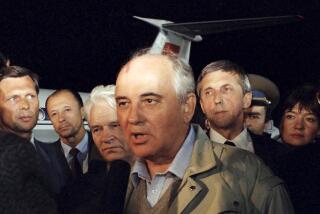SOVIET TURMOIL: GORBACHEV IN THE BRIAR PATCH : A Lesson for His Nation on Need for Unity : In dispatching troops to the Caucasus, the master politician may be looking ahead to another round of local elections.
- Share via
When we look at Mikhail Gorbachev’s past performances, we see him as one of the master politicians of this century. But when we evaluate his current policies, we consistently tag him as an incompetent.
We call Gorbachev the man of the decade, but still think that he has brought his economy to a state of collapse, his country to the point of civil war and disintegration and his party to the point of losing power.
All our attention is now focused on Azerbaijan and the Baltic republics. We assume that Gorbachev cannot introduce order because force would not work and/or because it would destroy his policy of perestroika . In reality, the opposite is true.
As Gorbachev learned from the Solidarity revolt in Poland in 1980-81, revolutionary upsurges generally last for only a few years. This was true of the 1848 revolution in Europe and the American radical movement in the late 1960s.
Revolutions have a tendency to radicalize (moderates like Martin Luther King Jr. lose influence to radicals like the Black Panthers) and the mass of the population becomes tired of the turmoil and its economic consequences. The radicals become separated from the moderates, and a reaction--a Thermidor , to use a term from the French Revolution--takes place. Leaders under attack should make concessions to the moderates, but then play the revolution as they would a big fish--let it run, let it tire itself out, then reel it in.
Gorbachev remembers that the Communist Party lost elections in Moscow, Leningrad and Siberia last March, and that it faces new local elections this March. He knows that his troops will fire on Lithuanians, if ordered, but he fears that 19-year-old ethnic Russian soldiers might not fire on 19-year-old ethnic Russian demonstrators in Moscow and Leningrad. If they won’t, his regime will face the fate of the Romanian party under Nicolae Ceausescu.
Gorbachev also knows that he needs very strong arguments to get Russians to accept peacefully the price increases and other painful costs of economic reform that he must take in order to make such reforms succeed.
What would a master politician do in these circumstances? Exactly what Gorbachev is doing. Like President Bush in 1988, Gorbachev has wrapped himself in the flag. He has deliberately let ethnic unrest become more extreme in order to remind his countrymen that the union is in danger and to try to separate the moderate non-Russians from the radicals. His speeches in Lithuania were primarily directed at the Russian television audience. They were part of the March election campaign and were designed to associate himself with the issue of national unity and to tar his democratic opponents as people who are willing to accept civil war and the breakup of the country. He will not go into the next election looking like a wimp.
Gorbachev in Lithuania, much like Bush before his intervention in Panama, was trying to build a case for decisive action. The attack by Azerbaijani extremists on Soviet-Iranian border posts, now the outbreak of tensions between Azerbaijanis and Armenians, gives him what he is looking for on the eve of a Central Committee plenum. The plenum will likely “force” him to be harsher than his mouthpieces will say that he wants to be, but he will get major economic reforms as the “concessions” to the Baltic peoples. Br’er Rabbit was no more skilled in getting himself thrown into the briar patch he wanted.
Most specialists dismiss this analysis and say it gives too much credit to Gorbachev. But they are the ones who are ready to give President Bush credit for making sophisticated domestic political calculations when he conducts his foreign policy, even though they assume that the Soviet leader is the better politician.
The problem is that deep in our hearts, we hope Gorbachev will fail. We don’t want to face up to the military consequence of a reunification of Germany. We don’t want to face up to the implications of the successful reform that is under way in the $2.8-trillion Soviet economy (bigger than that of Japan and the two Germanys combined). But Gorbachev is doing very well, and 1990 and ’91 will be years in which we will have to come to grips with that reality.
More to Read
Sign up for Essential California
The most important California stories and recommendations in your inbox every morning.
You may occasionally receive promotional content from the Los Angeles Times.













